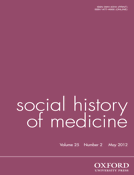-
Views
-
Cite
Cite
Joanna Bourke, Julie Anderson, War, Disability and Rehabilitation in Britain: ‘Soul of a Nation’, Social History of Medicine, Volume 25, Issue 2, May 2012, Pages 565–566, https://doi.org/10.1093/shm/hks004
Close - Share Icon Share
Extract
In 1954, an exasperated woman announced that ‘If I were a man, I should immediately marry a capable woman, preferably a nurse, and all my troubles would be solved!’ (p. 168). Her frustrations were understandable. She had been disabled as a result of war work during the 1939–45 war, but the pension system seemed distinctly unjust to women. It was not until 1941 that women were even allowed to claim an allowance for 100 per cent war disabilities, but the grants continued to focus on the needs of married men, who could depend on the unpaid labours of their wives. Disabled single women had no such luck. It was not all bad news. After all, the state did help considerably with medical issues, including fertility, but injured women found themselves pensioned out of military services at significantly lower financial terms and the post-war emphasis on motherhood largely excluded them.
Julie Anderson is one of the leading historians working in the area of Disability Studies. This field of enquiry used to be concerned primarily with ‘rescuing’ disabled people from the rather condescending approaches of many people in the past. It is now a much more sophisticated field, concerned with the complexity of the politics of disability and portraying interactions between the protagonists in more nuanced ways. Anderson's new book seeks to tell the stories of men and women who had been disabled as a result of military service. The book is primarily about the Second World War, although the first two chapters ‘set the scene’ in a broader fashion and the penultimate chapter follows the rehabilitated men and women into the post-1945 period. She correctly points out that the experiences of the 1939–45 war were pivotal in the lives of disabled people in twentieth century Britain, in part because many more people survived their serious injuries and the government was particularly desperate to reemploy highly trained personnel as soon as they were physically fit. It was in this context that rehabilitation took on a wholly new meaning, involving medical, social and economic techniques in a holistic fashion.




